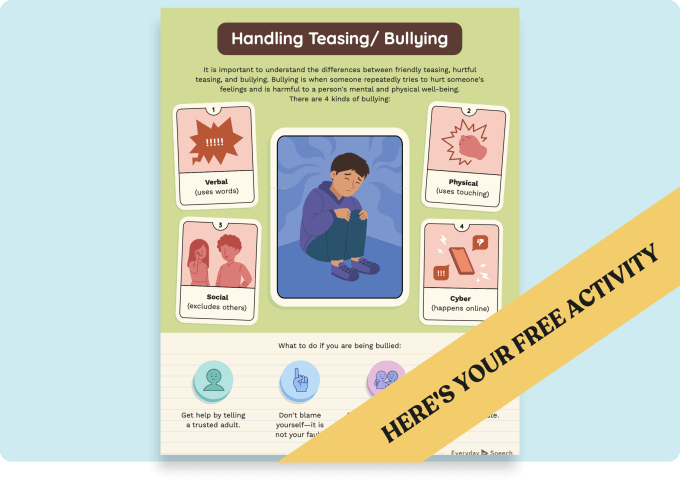Selecting Appropriate Conversation Topics for Middle School Students
Get free social skills materials
No-prep lessons on self-regulation, emotional recognition, conversation skills, and more.
Sign up hereIntroduction
As educators, we play a crucial role in helping our students develop essential social skills, including the ability to engage in meaningful conversations. One important aspect of successful conversations is selecting appropriate topics based on the person we’re talking to. This skill allows students to connect better with their peers, teachers, and other individuals by considering the interests and preferences of others. In this blog post, we’ll explore a no-prep activity to teach middle school students how to choose suitable conversation topics and provide discussion questions to stimulate further learning.
No-Prep Activity: Topic Switching
This activity is designed to help students practice selecting appropriate conversation topics based on the person they’re talking to. No materials or preparation are required from the educator.
- Divide the students into pairs.
- Assign each pair a specific relationship (e.g., teacher-student, friends, siblings, etc.).
- Ask the students to practice a conversation, taking turns speaking.
- After a minute or two, call out “Switch!” The students must then change the topic of the conversation, considering the interests and preferences of their partner based on the assigned relationship.
- Continue the activity for several rounds, allowing students to practice with different topics and relationships.
This activity provides students with the opportunity to practice choosing conversation topics that are relevant and engaging for their conversation partners, helping them develop empathy and social awareness.
Discussion Questions
- Why is it important to consider the interests and preferences of the person you’re talking to when choosing a conversation topic?
- Can you think of a time when you chose a conversation topic that wasn’t well-received by the person you were talking to? How did you handle the situation?
- How can you determine what topics might interest someone you don’t know well?
- What are some strategies for gracefully changing the subject if you realize the topic you’ve chosen isn’t engaging the other person?
- How does being able to choose appropriate conversation topics contribute to building positive relationships with others?
Related Skills
Developing the ability to select appropriate conversation topics is just one aspect of social-emotional learning. Some other related skills that can help middle school students improve their interpersonal relationships and communication abilities include:
- Active listening
- Empathy
- Non-verbal communication
- Conflict resolution
- Assertiveness
Next Steps
Incorporating social-emotional learning into your curriculum helps students develop critical skills that they’ll use throughout their lives. To access free sample materials of the discussed skill and others, visit Everyday Speech and sign up for a free account. These resources will provide you with engaging activities, videos, and lessons to support your students’ social-emotional learning journey.

